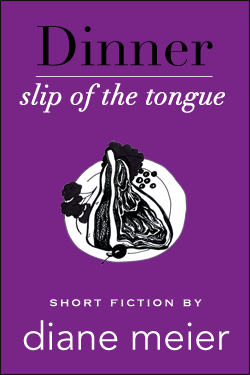Dinner: Slip of the Tongue
Thursday, June 09, 2011
Third in the Series of Three Short Stories: Breakfast, Lunch. Dinner (ORDER HERE)
After a lifetime of watching clients try to remove the best and most original things from our work, I knew how rare a spirit it was to be drawn to and not put off by the more original stuff of talent. In my case, Marjorie took pages and pages of story and asked me to re-write them. My heart began to sink. “There’s nothing wrong with what you have here,†she said with firm authority, “in fact, it’s really good. But dialogue is very hard to do well. Very few authors make it work.†I remember assuming that I was about to hear that I was one of those many writers who couldn’t make it work. To my surprise she continued, “-- but you do it really well.†Holy smoke. “What you need to do is show it off more.†Talk about motivation.
Once, a long time ago, after a particularly wrenching tumble, I saw an orthopedic surgeon, who approached me with the greeting, “Swimmer?†I must have looked surprised, because, of course, that’s just what I was – far more at home in water than on land. He listed his observations: short torso, powerful upper body, extra-long limbs, hyper-extended knees. “If you’re not a swimmer,†he said, “you should be, because you were designed for it.†Designed? I must have queried. And he said something like – “great athletes often exploit the deformity.†It was a shocking line. The deformity. “Well,†he explained, “the baseball player with the double-jointed shoulder, the basketball star who is seven feet tall, the swimmer with extra-long, hyper-flexible legs… these things aren’t normal... but these are the things that often create an athlete’s advantage.â€
So –a long way of explaining or excusing that Slip of the Tongue is nothing but dialogue. My homage to Malle’s My Dinner with André, uses the conceit of a piece where there is, essentially, no action at all beyond the ideas raised in conversation over dinner. Keep your ears peeled as a table full of media, art and publishing types meet at the Waverly Inn and haggle over the meaning of positioning and establishing value in contemporary life. References to Sontag and Barthes, Chanel, Hermes and Henry James bounce around, as we decide what’s real, what’s necessary, what’s status, what’s stature. And - is it the most important question, the difference between self-protection, self-deception and self-indulgence? Or is that just another question about comfort in one’s skin, a prickly tangent to the necessity of positioning and its part in creating opportunity.

